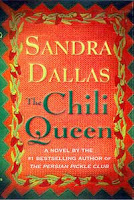 sets the novel during WWII in eastern Colorado at a Japanese internment camp which I had not known existed. A child from the camp is murdered and a farm girl from near the camp tells us the story of what happens. Part historical novel and part mystery, the story is engaging, the characters well developed, and the plot kept me turning the pages and wanting to read more by Dallas.
sets the novel during WWII in eastern Colorado at a Japanese internment camp which I had not known existed. A child from the camp is murdered and a farm girl from near the camp tells us the story of what happens. Part historical novel and part mystery, the story is engaging, the characters well developed, and the plot kept me turning the pages and wanting to read more by Dallas.I looked to our fiction shelves to see what we had and I was pleasantly surprised to find a good
 selection of well-circulated books. I have no excuse for missing this interesting author except that I keep my interest in mysteries at the forefront of my reading priorities.
selection of well-circulated books. I have no excuse for missing this interesting author except that I keep my interest in mysteries at the forefront of my reading priorities.Jane Smiley called Dallas "A quintessential American voice."
In reverse order, her novels are:
- Tallgrass

- New Mercies
- The Chili Queen
- Alice's Tulips
- The Diary of Mattie Spencer
- The Persian Pickle Club
- Buster's Midnight Cafe
Dallas has character references between several of her books which makes for an interesting link between them. She doesn't use the same characters over and over, but the references are to earlier times and to the children of earlier characters - it is fun to watch for them as one moves through the books. Quilting is another element in her books and
 she makes it interesting. She has an excellent ear for dialog, and her historical detail rings true. My favorite is probably The Diary of Mattie Spencer and I have passed my recommendation on Dallas along to many readers.
she makes it interesting. She has an excellent ear for dialog, and her historical detail rings true. My favorite is probably The Diary of Mattie Spencer and I have passed my recommendation on Dallas along to many readers.My experience was that once I began one of these books I couldn't wait to get back to the story and I was sorry to have it end. You may enjoy them.







